Unit 5 Nelson Mandela - a modern hero教案
文档属性
| 名称 | Unit 5 Nelson Mandela - a modern hero教案 | 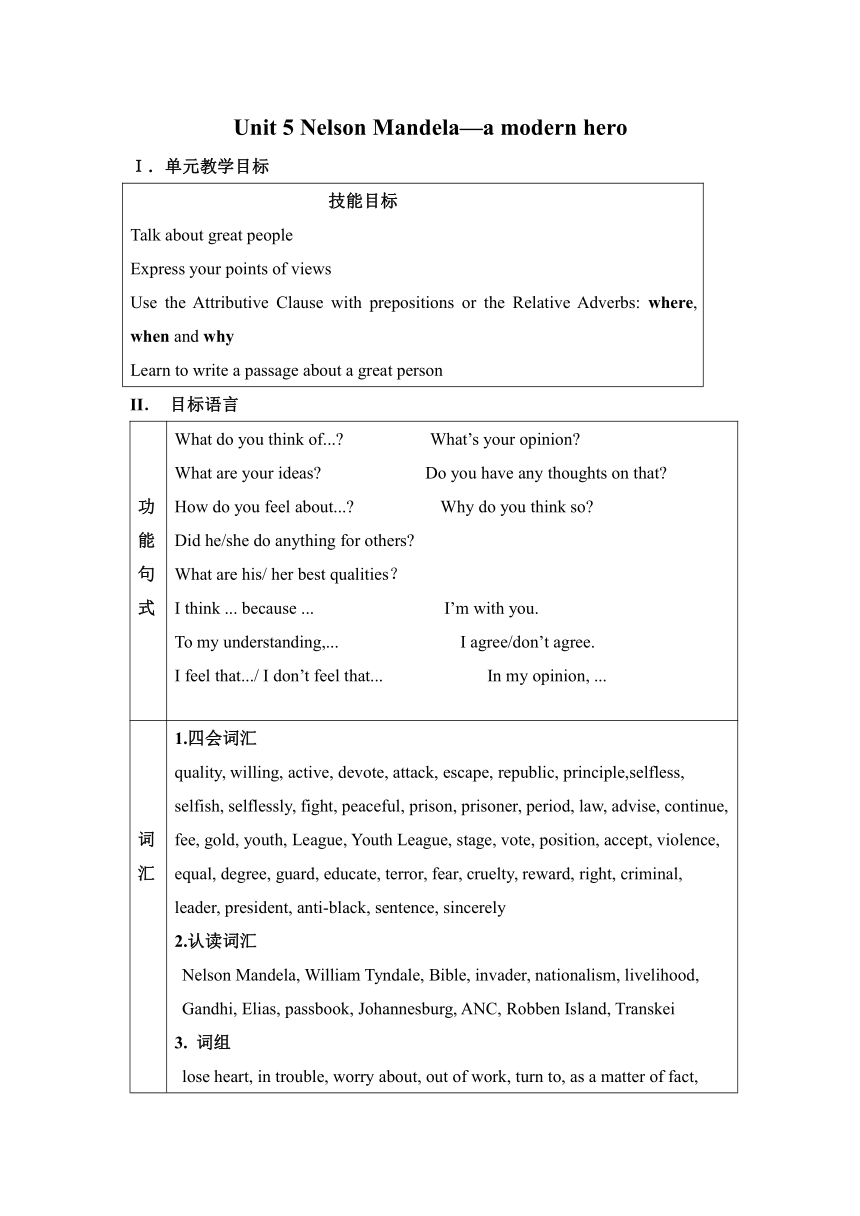 | |
| 格式 | zip | ||
| 文件大小 | 46.7KB | ||
| 资源类型 | 教案 | ||
| 版本资源 | 人教版(新课程标准) | ||
| 科目 | 英语 | ||
| 更新时间 | 2012-10-30 08:14:16 | ||
图片预览

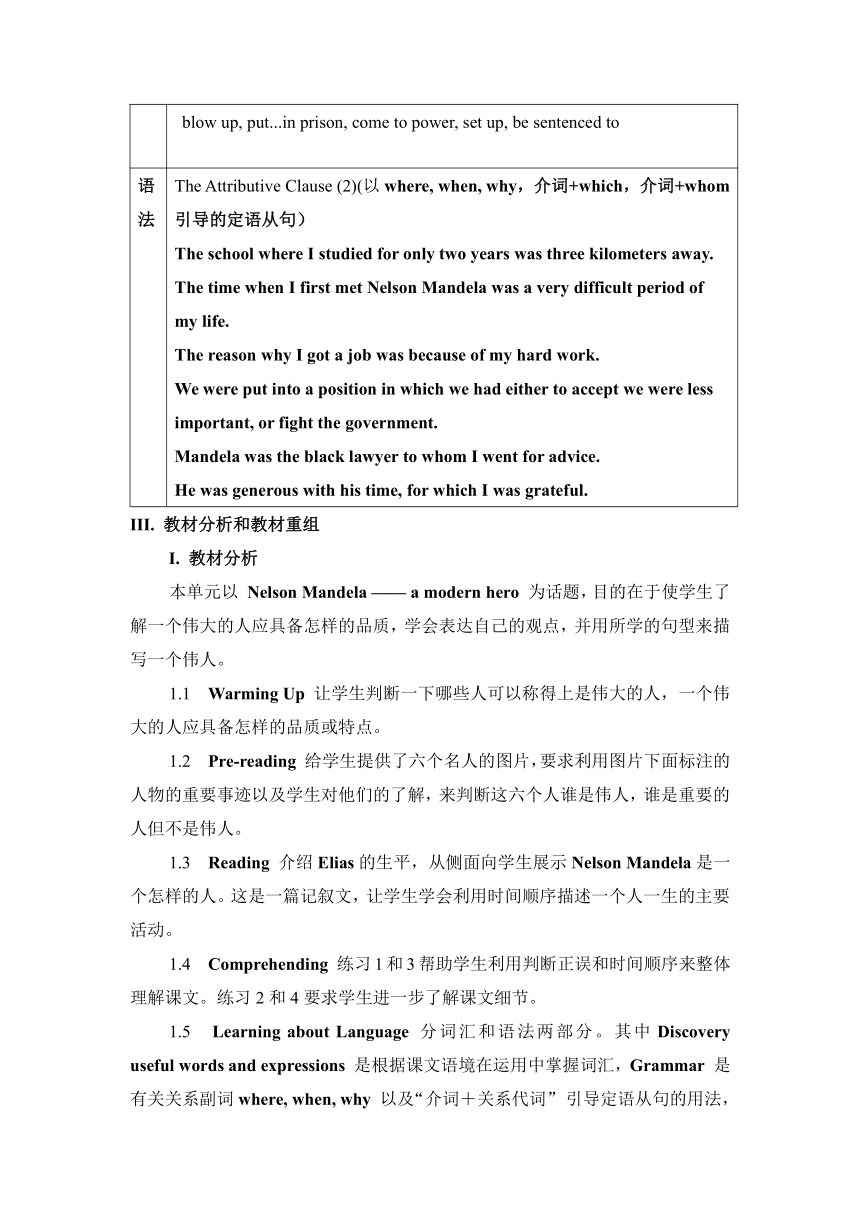
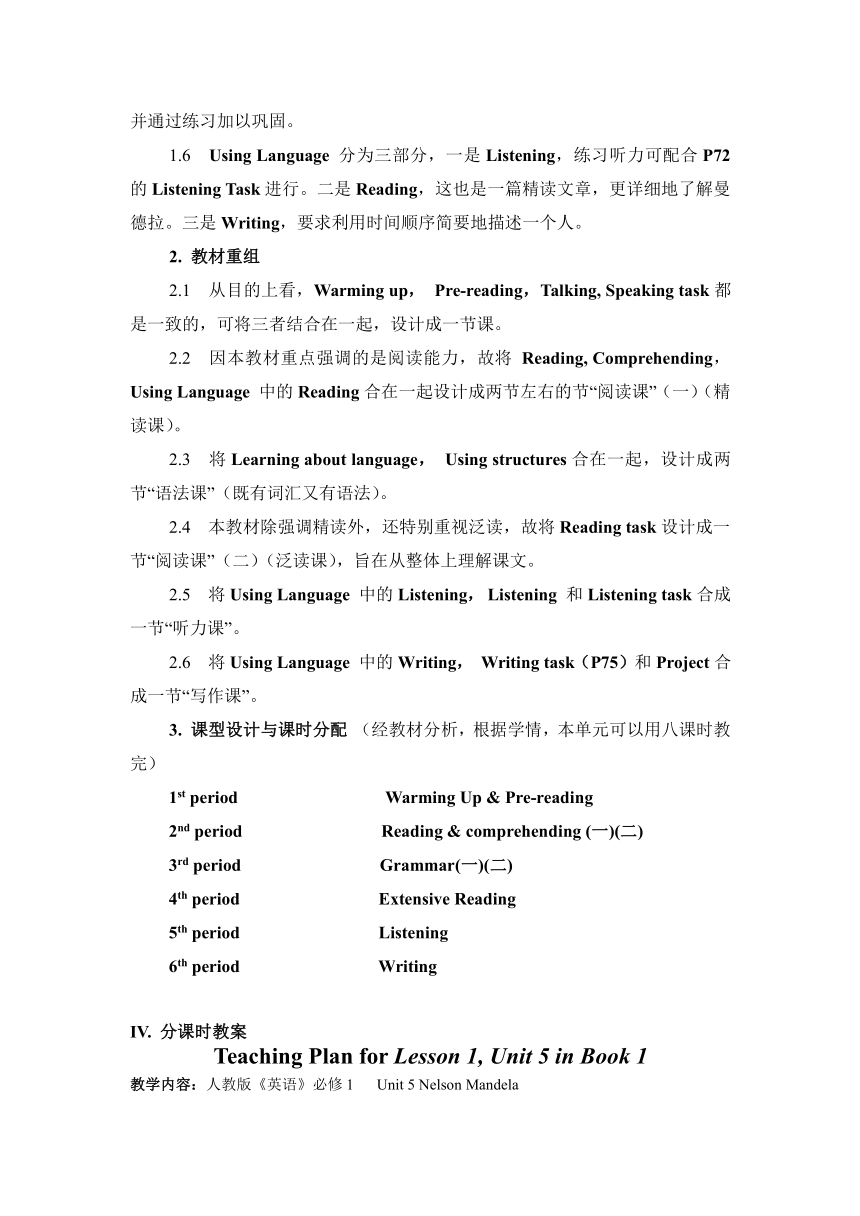
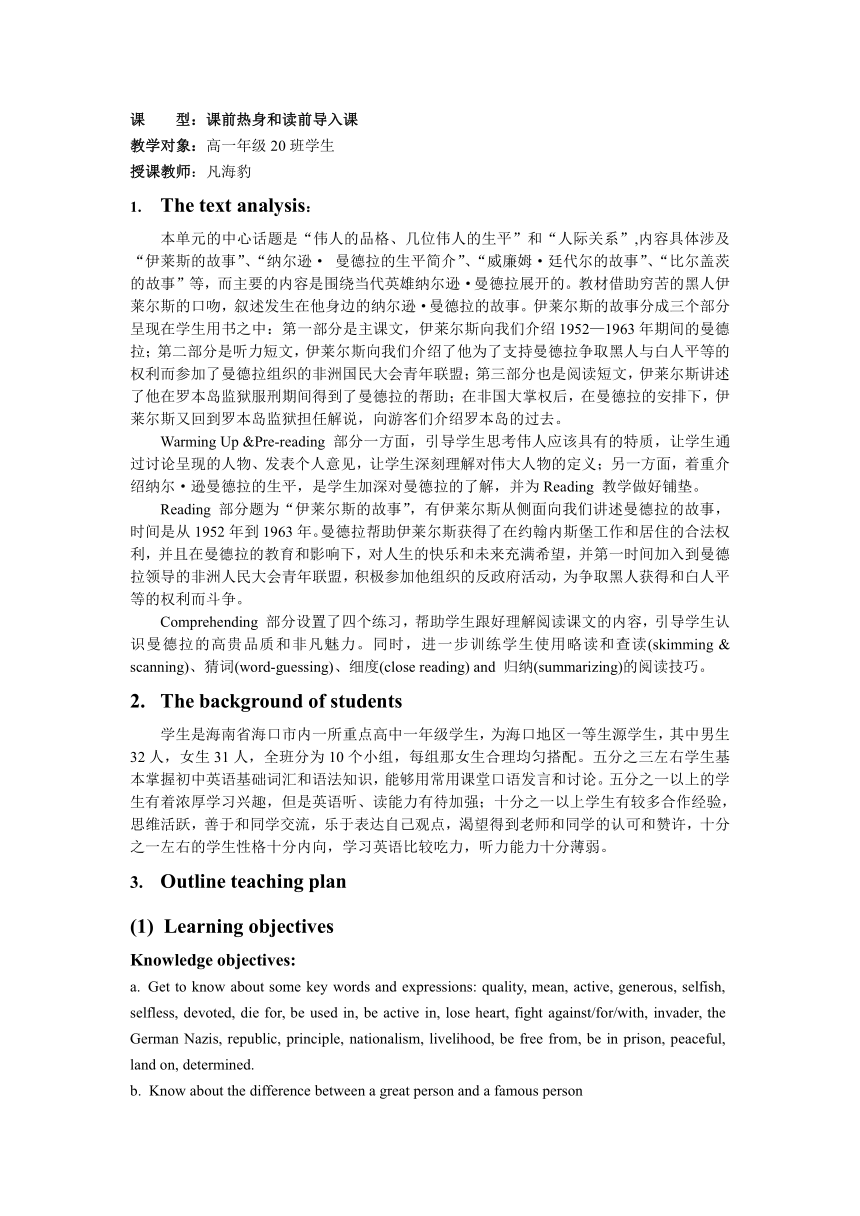
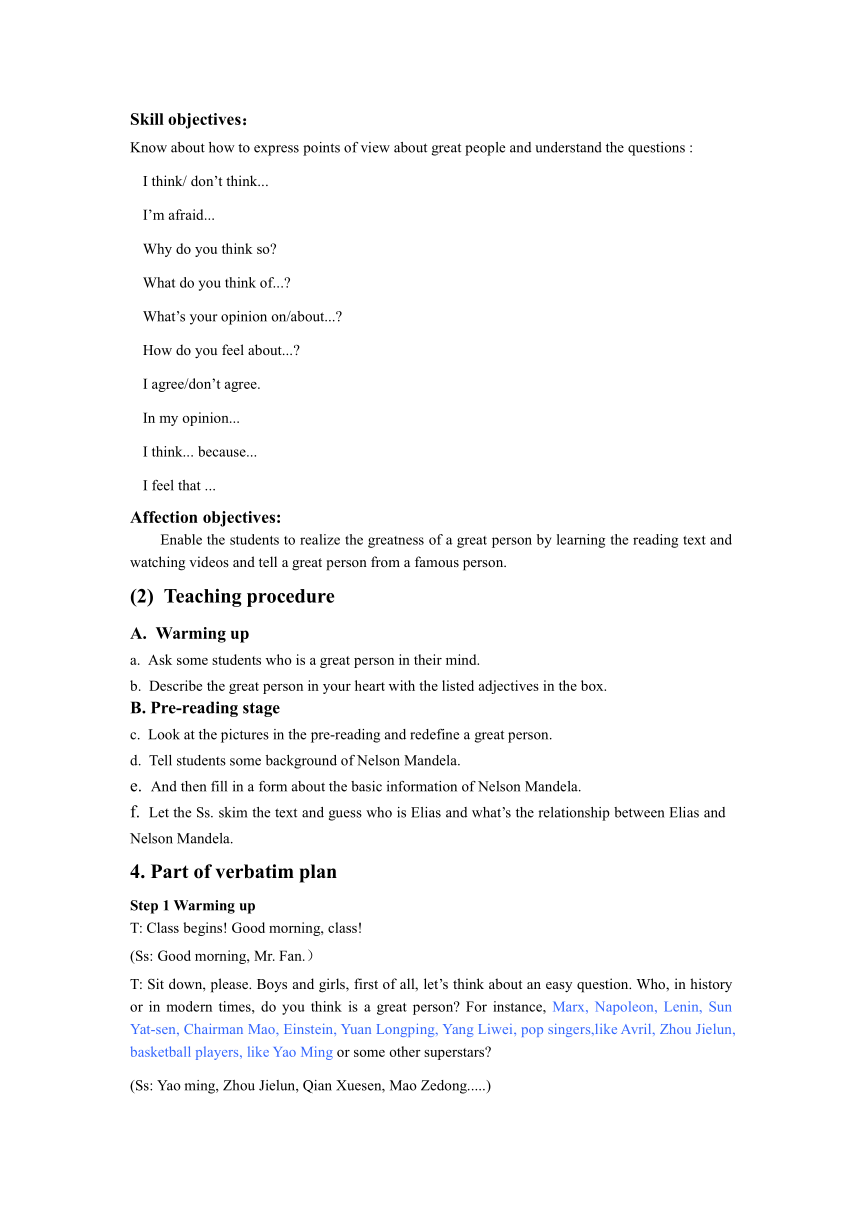
文档简介
Unit 5 Nelson Mandela—a modern hero
I.单元教学目标
技能目标
Talk about great people
Express your points of views
Use the Attributive Clause with prepositions or the Relative Adverbs: where, when and why
Learn to write a passage about a great person
II. 目标语言
功
能
句
式
What do you think of...? What’s your opinion?
What are your ideas? Do you have any thoughts on that?
How do you feel about...? Why do you think so?
Did he/she do anything for others?
What are his/ her best qualities?
I think ... because ... I’m with you.
To my understanding,... I agree/don’t agree.
I feel that.../ I don’t feel that... In my opinion, ...
词汇
1.四会词汇
quality, willing, active, devote, attack, escape, republic, principle,selfless, selfish, selflessly, fight, peaceful, prison, prisoner, period, law, advise, continue, fee, gold, youth, League, Youth League, stage, vote, position, accept, violence, equal, degree, guard, educate, terror, fear, cruelty, reward, right, criminal, leader, president, anti-black, sentence, sincerely
2.认读词汇
Nelson Mandela, William Tyndale, Bible, invader, nationalism, livelihood, Gandhi, Elias, passbook, Johannesburg, ANC, Robben Island, Transkei
3. 词组
lose heart, in trouble, worry about, out of work, turn to, as a matter of fact, blow up, put...in prison, come to power, set up, be sentenced to
语法
The Attributive Clause (2)(以where, when, why,介词+which,介词+whom引导的定语从句)
The school where I studied for only two years was three kilometers away.
The time when I first met Nelson Mandela was a very difficult period of my life.
The reason why I got a job was because of my hard work.
We were put into a position in which we had either to accept we were less important, or fight the government.
Mandela was the black lawyer to whom I went for advice.
He was generous with his time, for which I was grateful.
III. 教材分析和教材重组
I. 教材分析
本单元以 Nelson Mandela —— a modern hero 为话题,目的在于使学生了解一个伟大的人应具备怎样的品质,学会表达自己的观点,并用所学的句型来描写一个伟人。
1.1 Warming Up 让学生判断一下哪些人可以称得上是伟大的人,一个伟大的人应具备怎样的品质或特点。
1.2 Pre-reading 给学生提供了六个名人的图片,要求利用图片下面标注的人物的重要事迹以及学生对他们的了解,来判断这六个人谁是伟人,谁是重要的人但不是伟人。
1.3 Reading 介绍Elias的生平,从侧面向学生展示Nelson Mandela是一个怎样的人。这是一篇记叙文,让学生学会利用时间顺序描述一个人一生的主要活动。
1.4 Comprehending 练习1和3帮助学生利用判断正误和时间顺序来整体理解课文。练习2和4要求学生进一步了解课文细节。
1.5 Learning about Language 分词汇和语法两部分。其中Discovery useful words and expressions 是根据课文语境在运用中掌握词汇,Grammar 是有关关系副词where, when, why 以及“介词+关系代词” 引导定语从句的用法,并通过练习加以巩固。
1.6 Using Language 分为三部分,一是Listening,练习听力可配合P72的Listening Task进行。二是Reading,这也是一篇精读文章,更详细地了解曼德拉。三是Writing,要求利用时间顺序简要地描述一个人。
2. 教材重组
2.1 从目的上看,Warming up, Pre-reading,Talking, Speaking task都是一致的,可将三者结合在一起,设计成一节课。
2.2 因本教材重点强调的是阅读能力,故将 Reading, Comprehending, Using Language 中的Reading合在一起设计成两节左右的节“阅读课”(一)(精读课)。
2.3 将Learning about language, Using structures合在一起,设计成两节“语法课”(既有词汇又有语法)。
2.4 本教材除强调精读外,还特别重视泛读,故将Reading task设计成一节“阅读课”(二)(泛读课),旨在从整体上理解课文。
2.5 将Using Language 中的Listening, Listening 和Listening task合成一节“听力课”。
2.6 将Using Language 中的Writing, Writing task(P75)和Project合成一节“写作课”。
3. 课型设计与课时分配 (经教材分析,根据学情,本单元可以用八课时教完)
1st period Warming Up & Pre-reading
2nd period Reading & comprehending (一)(二)
3rd period Grammar(一)(二)
4th period Extensive Reading
5th period Listening
6th period Writing
IV. 分课时教案
Teaching Plan for Lesson 1, Unit 5 in Book 1
教学内容:人教版《英语》必修1 Unit 5 Nelson Mandela
课 型:课前热身和读前导入课
教学对象:高一年级20班学生
授课教师:凡海豹
The text analysis:
本单元的中心话题是“伟人的品格、几位伟人的生平”和“人际关系”,内容具体涉及“伊莱斯的故事”、“纳尔逊· 曼德拉的生平简介”、“威廉姆·廷代尔的故事”、“比尔盖茨的故事”等,而主要的内容是围绕当代英雄纳尔逊·曼德拉展开的。教材借助穷苦的黑人伊莱尔斯的口吻,叙述发生在他身边的纳尔逊·曼德拉的故事。伊莱尔斯的故事分成三个部分呈现在学生用书之中:第一部分是主课文,伊莱尔斯向我们介绍1952—1963年期间的曼德拉;第二部分是听力短文,伊莱尔斯向我们介绍了他为了支持曼德拉争取黑人与白人平等的权利而参加了曼德拉组织的非洲国民大会青年联盟;第三部分也是阅读短文,伊莱尔斯讲述了他在罗本岛监狱服刑期间得到了曼德拉的帮助;在非国大掌权后,在曼德拉的安排下,伊莱尔斯又回到罗本岛监狱担任解说,向游客们介绍罗本岛的过去。
Warming Up &Pre-reading 部分一方面,引导学生思考伟人应该具有的特质,让学生通过讨论呈现的人物、发表个人意见,让学生深刻理解对伟大人物的定义;另一方面,着重介绍纳尔·逊曼德拉的生平,是学生加深对曼德拉的了解,并为Reading 教学做好铺垫。
Reading 部分题为“伊莱尔斯的故事”,有伊莱尔斯从侧面向我们讲述曼德拉的故事,时间是从1952年到1963年。曼德拉帮助伊莱尔斯获得了在约翰内斯堡工作和居住的合法权利,并且在曼德拉的教育和影响下,对人生的快乐和未来充满希望,并第一时间加入到曼德拉领导的非洲人民大会青年联盟,积极参加他组织的反政府活动,为争取黑人获得和白人平等的权利而斗争。
Comprehending 部分设置了四个练习,帮助学生跟好理解阅读课文的内容,引导学生认识曼德拉的高贵品质和非凡魅力。同时,进一步训练学生使用略读和查读(skimming & scanning)、猜词(word-guessing)、细度(close reading) and 归纳(summarizing)的阅读技巧。
The background of students
学生是海南省海口市内一所重点高中一年级学生,为海口地区一等生源学生,其中男生32人,女生31人,全班分为10个小组,每组那女生合理均匀搭配。五分之三左右学生基本掌握初中英语基础词汇和语法知识,能够用常用课堂口语发言和讨论。五分之一以上的学生有着浓厚学习兴趣,但是英语听、读能力有待加强;十分之一以上学生有较多合作经验,思维活跃,善于和同学交流,乐于表达自己观点,渴望得到老师和同学的认可和赞许,十分之一左右的学生性格十分内向,学习英语比较吃力,听力能力十分薄弱。
Outline teaching plan
Learning objectives
Knowledge objectives:
Get to know about some key words and expressions: quality, mean, active, generous, selfish, selfless, devoted, die for, be used in, be active in, lose heart, fight against/for/with, invader, the German Nazis, republic, principle, nationalism, livelihood, be free from, be in prison, peaceful, land on, determined.
Know about the difference between a great person and a famous person
Skill objectives:
Know about how to express points of view about great people and understand the questions :
I think/ don’t think...
I’m afraid...
Why do you think so?
What do you think of...?
What’s your opinion on/about...?
How do you feel about...?
I agree/don’t agree.
In my opinion...
I think... because...
I feel that ...
Affection objectives:
Enable the students to realize the greatness of a great person by learning the reading text and watching videos and tell a great person from a famous person.
Teaching procedure
Warming up
Ask some students who is a great person in their mind.
Describe the great person in your heart with the listed adjectives in the box.
B. Pre-reading stage
Look at the pictures in the pre-reading and redefine a great person.
Tell students some background of Nelson Mandela.
And then fill in a form about the basic information of Nelson Mandela.
Let the Ss. skim the text and guess who is Elias and what’s the relationship between Elias and Nelson Mandela.
4. Part of verbatim plan
Step 1 Warming up
T: Class begins! Good morning, class!
(Ss: Good morning, Mr. Fan.)
T: Sit down, please. Boys and girls, first of all, let’s think about an easy question. Who, in history or in modern times, do you think is a great person? For instance, Marx, Napoleon, Lenin, Sun Yat-sen, Chairman Mao, Einstein, Yuan Longping, Yang Liwei, pop singers,like Avril, Zhou Jielun, basketball players, like Yao Ming or some other superstars?
(Ss: Yao ming, Zhou Jielun, Qian Xuesen, Mao Zedong.....)
T: OK, 符朝惠, who do you think is a great person?
(Fzh: Zhou Enlai. )
T: Class, 符朝惠says that Chairman Mao, Mao Zedong, is a great person. Then why do you think he is a great person?
(Ss: Because he was very popular and great and he made a great contribution to the liberation(解放) of our country.)
T: Very good, 符朝惠says that Chairman Mao, Mao Zedong who made a great contribution to the liberation of China is a great person. Do you agree?
(Ss:Yes.)
T: OK, as a great person, what kind of quality did Chairman Mao have? Was he brave or cowardly, selfless or selfish, devoted or mean?
(Ss: He was brave, selfless and devoted. )
T: I like your answer, sit down. And 刘美玲, what about you? (T ask two or three Ss about their opinions)
(Ss: Yes/No...)
T: Well, let’s see far more famous persons in history or in modern times. Look at the screen. Are they all great people or who is just a famous person but not a great person?
(Ss: In my opinion, Neil Armstrong is not a great person, because he only landed on the moon, which is not only his work, but the work of many people.....)
T: OK, so what is a great person in your mind? In other words, what kind of person can be called a great person? Any volunteers? Who wanna have a try,? Just stand up is ok.( Boys and girls, this is your class, you have to be brave. Remember what I’ve told you? If you wanna make a great progress with your English, besides my help, you have to be brave! Wanna to improve your English, boys and girls? Just speak out!)
(Ss:To my understanding, a great person is someone who should be kind, brave, determined and confident. As a great person, he /she first should be kind-hearted. Only when he /she is kind-hearted, he/she can help people who are in trouble. Second he/she should be brave. When he /she facing the danger, fear or terror, he won’t be afraid. Last he/she should be determined and confident, when he/she has confidence, he/she will never lose heart in front of failure. In a word, I think a kind heart, bravery, determination and confidence can make a great person)
T: Great! I appreciate your opinions. Now, let’s have a summary. As a great person, he/she should devote his whole life to fighting for the happiness of mankind. Am I right? Well, now turn to page 33, today we are going to learn Unit 5 Nelson Mandela — a modern hero. Well, boys and girls, do you know Nelson Mandela?
(Ss: Yes/No,...)
T: What do you know about him? For instance, who is he? Where is he from? What is he?
(Ss: He is a black man/ He comes from South Africa/He is the ex-president of South Africa...)
T: Anything else? What did he do in the history of South Africa?
(Ss: He fought for black for black people and he get the Nobel Peace Prize )
T: Quite good, sit down. Here I have a short video for you, watch carefully and think about what kind of a person he is, clear?
(Ss: Yes,...)
T: What is my question?
(Ss:What kind of a person he is)
T: What kind of a person Nelson Mandela is, boys and girls? Is he a great man? What are his three principles?
(Ss: He is a great person. He is brave, selfless, determined and forgiving. “Non-violence, tolerance and integration”)
T: Now turn to page34, let’s come to reading, what’s the title? Read it out loudly.
(Ss:Elias’ Story!)
T: Boys and girls, skim the text in one minute and answer my question. Who is Elias and what’s the relationship between Elias and Nelson Mandela. Clear? OK, one, two, go!(Do not read the text word by word, sentence by sentence. You can not finish it in two minutes, so you have to read it with my questions, clear? Just look for the answers! OK, time’s up! What’s your answers, just shout out!
(Ss: Elias is a poor black worker, he is Mandela’s follower.)
T: Nice, so much for today, your homework is read after the tape two to three times before next class.
Teaching Plan for Lesson 2, Unit 5 in Book 1
Content of course: Reading& comprehending
Learning objectives
Knowledge objectives:
Know about the story about Nelson·Mandela;
Master the words and phrases in text:
lawyer, guidance, legal, fee, out of work, hopeful, vote, attack, violence, as a matter of fact, blow up, equal, in trouble, unfair, turn to
Skill objectives:
Learn to predict the possible contents of a text through skimming the first and last sentence of each paragraph when read a narrative story.
Learn to sum up the main idea of quotations through skimming and guessing, with help of the backgrounds as well as key words or phrases.
Learn to scan for key information by spotting the verbal phrases and adjectives.
Learn to make brief summary of the text under the teacher’s guidance.
Affection objectives:
Get Ss to know about Mandela’s stories and realize the importance of Mandela’s devoted fighting for the blacks’ equal rights and the district peace.
Teaching procedure
A. Pre-reading
Check the homework exercise and ask some students some main points of last class.
Remind Ss the life of Mandela by a guessing game and then list some more main details on the screen.
Tell students some tips and ask four basic questions before reading.
B. While-reading Stage
Skimming and Scanning:
Skim the first paragraph and then answer the questions on the screen;
And then fill in two forms about the basic information of the first two paragraphs.
Let the Ss.talk about the wring style of the text.
d. Scan the text quickly and choose the main idea of each paragraph on the screen:
e. Divide the text into two parts then sum up the general idea of each part
Skimming and Scanning:
Read Para. 1 and answer the four questions presented before reading.
Read Para. 2 and answer the five questions presented before reading.
Sum up the first two paragraphs and fill in the timeline.
Read Para. 3 and answer the two questions presented before reading.i
Remind the backgrounds of the Para. 4 before reading by watching a video for two minutes.
Read Para. 4 and fill in the blanks about the truth of the black people then answer the four questions one by one. Read Para. 5 and answer the question presented.
C. Post-reading
Decide True or False closed book.
Get Ss. fill in the blanks of a short summary about the text.
Homework
Read the passage again and try to retell it.
Finish off the related Workbook exercises on page 36.
4. Part of verbatim plan for reading (1)
Pre-reading:
T: Class begins! Good afternoon, class!
(Ss:Good afternoon, Mr Fan. )
T: Sit down, please. Well fist of all, let’s review what we’v learned last class. ) 魏德天, question 1, do you remember the guessing game we did last class?
(Ss:...)
T: Well,what was Curie, remember her carrier or job?
(Ss: She was a scientist.)
T: Yes, then why did she got the Nobel Prize twice?
(Ss: She found the radioactivity (放射现象) and discover polonium (钋)and radium(镭))
T: Was she a great person? Do you admire her?
(Ss:Yes, she was. Yes, I do)
T: Nice, sit down, next one, 王慧妮, please., question 2, Remember the adjectives(形容词) we’ve learned in warming up?
(Ss: Curie is a hardworking, modest and devoted heroin in science. )
(T finish the other two questions in similar way.)
T:Look at the screen, Let’s do a guessing game together. Try to guess who is she or he by the tips, clear? (Showing the tips one by one)
(Ss:Yes/No...)
T: Who is she or he?
(Ss: Nelson Mandela)
T: Terrific, it seems that your are familiar with Mandela quite well. Now let’s go on with Unit 5, Part 3, Reading. Before skimming, let’s see some questions firstly. Then show the answers one by one after Ss’ skimming.
(Ss:....)
T: Boys and girls, do you know the style of the text? Look at the screen, is it an argumentation, an exposition or a narration? 吴奇斌, stand up, can you decide(判断) the style of this text?
(Ss: It’s a narration .)
T: Right, then what’s the story about?
(Ss: The story is about Elias and Mandela...)
T: Not enough, but quite good. Look, here I show my understanding about the text. Let read it out laud.
(Ss:Reading the words)
T: Let’s go. Now scanning the text, scanning means reading the important parts of each paragraph in a short time. Do you know which are the important parts of each paragraph.
(Ss: The first sentence at the beginning/ The last sentence at the beginning/...)
T: Very good, well , just pay attention the first and last sentence of each paragraph is OK. Now go through the text quickly and then choose the general idea of each paragraph on the screen. You have one minute, on, two ,go! Time is up, 曾银, what’s your answers?
(S: My answer is DBAEC...)
T: Good job, sit down. Now, let’s divide the text into two parts, and sum up the general idea of each part. First of all, how should we divide the text? Discuss with your partner how to divide the text into two parts. 王杰 what’s your idea?
(Ss: The first two paragraph and the last three paragraph. )
T: Nice, so why do you dive it by this way? In other words, what’s the general idea of each part in your understanding?
(Ss:....)
T: Look at the screen,( Here is my understanding,) It doesn’t matter, we need read the text in details and later you may understand it better. After class, please read the text for two more times and finish the exercises about words and expressions on you exercise book, clear? OK, so much for today.
I.单元教学目标
技能目标
Talk about great people
Express your points of views
Use the Attributive Clause with prepositions or the Relative Adverbs: where, when and why
Learn to write a passage about a great person
II. 目标语言
功
能
句
式
What do you think of...? What’s your opinion?
What are your ideas? Do you have any thoughts on that?
How do you feel about...? Why do you think so?
Did he/she do anything for others?
What are his/ her best qualities?
I think ... because ... I’m with you.
To my understanding,... I agree/don’t agree.
I feel that.../ I don’t feel that... In my opinion, ...
词汇
1.四会词汇
quality, willing, active, devote, attack, escape, republic, principle,selfless, selfish, selflessly, fight, peaceful, prison, prisoner, period, law, advise, continue, fee, gold, youth, League, Youth League, stage, vote, position, accept, violence, equal, degree, guard, educate, terror, fear, cruelty, reward, right, criminal, leader, president, anti-black, sentence, sincerely
2.认读词汇
Nelson Mandela, William Tyndale, Bible, invader, nationalism, livelihood, Gandhi, Elias, passbook, Johannesburg, ANC, Robben Island, Transkei
3. 词组
lose heart, in trouble, worry about, out of work, turn to, as a matter of fact, blow up, put...in prison, come to power, set up, be sentenced to
语法
The Attributive Clause (2)(以where, when, why,介词+which,介词+whom引导的定语从句)
The school where I studied for only two years was three kilometers away.
The time when I first met Nelson Mandela was a very difficult period of my life.
The reason why I got a job was because of my hard work.
We were put into a position in which we had either to accept we were less important, or fight the government.
Mandela was the black lawyer to whom I went for advice.
He was generous with his time, for which I was grateful.
III. 教材分析和教材重组
I. 教材分析
本单元以 Nelson Mandela —— a modern hero 为话题,目的在于使学生了解一个伟大的人应具备怎样的品质,学会表达自己的观点,并用所学的句型来描写一个伟人。
1.1 Warming Up 让学生判断一下哪些人可以称得上是伟大的人,一个伟大的人应具备怎样的品质或特点。
1.2 Pre-reading 给学生提供了六个名人的图片,要求利用图片下面标注的人物的重要事迹以及学生对他们的了解,来判断这六个人谁是伟人,谁是重要的人但不是伟人。
1.3 Reading 介绍Elias的生平,从侧面向学生展示Nelson Mandela是一个怎样的人。这是一篇记叙文,让学生学会利用时间顺序描述一个人一生的主要活动。
1.4 Comprehending 练习1和3帮助学生利用判断正误和时间顺序来整体理解课文。练习2和4要求学生进一步了解课文细节。
1.5 Learning about Language 分词汇和语法两部分。其中Discovery useful words and expressions 是根据课文语境在运用中掌握词汇,Grammar 是有关关系副词where, when, why 以及“介词+关系代词” 引导定语从句的用法,并通过练习加以巩固。
1.6 Using Language 分为三部分,一是Listening,练习听力可配合P72的Listening Task进行。二是Reading,这也是一篇精读文章,更详细地了解曼德拉。三是Writing,要求利用时间顺序简要地描述一个人。
2. 教材重组
2.1 从目的上看,Warming up, Pre-reading,Talking, Speaking task都是一致的,可将三者结合在一起,设计成一节课。
2.2 因本教材重点强调的是阅读能力,故将 Reading, Comprehending, Using Language 中的Reading合在一起设计成两节左右的节“阅读课”(一)(精读课)。
2.3 将Learning about language, Using structures合在一起,设计成两节“语法课”(既有词汇又有语法)。
2.4 本教材除强调精读外,还特别重视泛读,故将Reading task设计成一节“阅读课”(二)(泛读课),旨在从整体上理解课文。
2.5 将Using Language 中的Listening, Listening 和Listening task合成一节“听力课”。
2.6 将Using Language 中的Writing, Writing task(P75)和Project合成一节“写作课”。
3. 课型设计与课时分配 (经教材分析,根据学情,本单元可以用八课时教完)
1st period Warming Up & Pre-reading
2nd period Reading & comprehending (一)(二)
3rd period Grammar(一)(二)
4th period Extensive Reading
5th period Listening
6th period Writing
IV. 分课时教案
Teaching Plan for Lesson 1, Unit 5 in Book 1
教学内容:人教版《英语》必修1 Unit 5 Nelson Mandela
课 型:课前热身和读前导入课
教学对象:高一年级20班学生
授课教师:凡海豹
The text analysis:
本单元的中心话题是“伟人的品格、几位伟人的生平”和“人际关系”,内容具体涉及“伊莱斯的故事”、“纳尔逊· 曼德拉的生平简介”、“威廉姆·廷代尔的故事”、“比尔盖茨的故事”等,而主要的内容是围绕当代英雄纳尔逊·曼德拉展开的。教材借助穷苦的黑人伊莱尔斯的口吻,叙述发生在他身边的纳尔逊·曼德拉的故事。伊莱尔斯的故事分成三个部分呈现在学生用书之中:第一部分是主课文,伊莱尔斯向我们介绍1952—1963年期间的曼德拉;第二部分是听力短文,伊莱尔斯向我们介绍了他为了支持曼德拉争取黑人与白人平等的权利而参加了曼德拉组织的非洲国民大会青年联盟;第三部分也是阅读短文,伊莱尔斯讲述了他在罗本岛监狱服刑期间得到了曼德拉的帮助;在非国大掌权后,在曼德拉的安排下,伊莱尔斯又回到罗本岛监狱担任解说,向游客们介绍罗本岛的过去。
Warming Up &Pre-reading 部分一方面,引导学生思考伟人应该具有的特质,让学生通过讨论呈现的人物、发表个人意见,让学生深刻理解对伟大人物的定义;另一方面,着重介绍纳尔·逊曼德拉的生平,是学生加深对曼德拉的了解,并为Reading 教学做好铺垫。
Reading 部分题为“伊莱尔斯的故事”,有伊莱尔斯从侧面向我们讲述曼德拉的故事,时间是从1952年到1963年。曼德拉帮助伊莱尔斯获得了在约翰内斯堡工作和居住的合法权利,并且在曼德拉的教育和影响下,对人生的快乐和未来充满希望,并第一时间加入到曼德拉领导的非洲人民大会青年联盟,积极参加他组织的反政府活动,为争取黑人获得和白人平等的权利而斗争。
Comprehending 部分设置了四个练习,帮助学生跟好理解阅读课文的内容,引导学生认识曼德拉的高贵品质和非凡魅力。同时,进一步训练学生使用略读和查读(skimming & scanning)、猜词(word-guessing)、细度(close reading) and 归纳(summarizing)的阅读技巧。
The background of students
学生是海南省海口市内一所重点高中一年级学生,为海口地区一等生源学生,其中男生32人,女生31人,全班分为10个小组,每组那女生合理均匀搭配。五分之三左右学生基本掌握初中英语基础词汇和语法知识,能够用常用课堂口语发言和讨论。五分之一以上的学生有着浓厚学习兴趣,但是英语听、读能力有待加强;十分之一以上学生有较多合作经验,思维活跃,善于和同学交流,乐于表达自己观点,渴望得到老师和同学的认可和赞许,十分之一左右的学生性格十分内向,学习英语比较吃力,听力能力十分薄弱。
Outline teaching plan
Learning objectives
Knowledge objectives:
Get to know about some key words and expressions: quality, mean, active, generous, selfish, selfless, devoted, die for, be used in, be active in, lose heart, fight against/for/with, invader, the German Nazis, republic, principle, nationalism, livelihood, be free from, be in prison, peaceful, land on, determined.
Know about the difference between a great person and a famous person
Skill objectives:
Know about how to express points of view about great people and understand the questions :
I think/ don’t think...
I’m afraid...
Why do you think so?
What do you think of...?
What’s your opinion on/about...?
How do you feel about...?
I agree/don’t agree.
In my opinion...
I think... because...
I feel that ...
Affection objectives:
Enable the students to realize the greatness of a great person by learning the reading text and watching videos and tell a great person from a famous person.
Teaching procedure
Warming up
Ask some students who is a great person in their mind.
Describe the great person in your heart with the listed adjectives in the box.
B. Pre-reading stage
Look at the pictures in the pre-reading and redefine a great person.
Tell students some background of Nelson Mandela.
And then fill in a form about the basic information of Nelson Mandela.
Let the Ss. skim the text and guess who is Elias and what’s the relationship between Elias and Nelson Mandela.
4. Part of verbatim plan
Step 1 Warming up
T: Class begins! Good morning, class!
(Ss: Good morning, Mr. Fan.)
T: Sit down, please. Boys and girls, first of all, let’s think about an easy question. Who, in history or in modern times, do you think is a great person? For instance, Marx, Napoleon, Lenin, Sun Yat-sen, Chairman Mao, Einstein, Yuan Longping, Yang Liwei, pop singers,like Avril, Zhou Jielun, basketball players, like Yao Ming or some other superstars?
(Ss: Yao ming, Zhou Jielun, Qian Xuesen, Mao Zedong.....)
T: OK, 符朝惠, who do you think is a great person?
(Fzh: Zhou Enlai. )
T: Class, 符朝惠says that Chairman Mao, Mao Zedong, is a great person. Then why do you think he is a great person?
(Ss: Because he was very popular and great and he made a great contribution to the liberation(解放) of our country.)
T: Very good, 符朝惠says that Chairman Mao, Mao Zedong who made a great contribution to the liberation of China is a great person. Do you agree?
(Ss:Yes.)
T: OK, as a great person, what kind of quality did Chairman Mao have? Was he brave or cowardly, selfless or selfish, devoted or mean?
(Ss: He was brave, selfless and devoted. )
T: I like your answer, sit down. And 刘美玲, what about you? (T ask two or three Ss about their opinions)
(Ss: Yes/No...)
T: Well, let’s see far more famous persons in history or in modern times. Look at the screen. Are they all great people or who is just a famous person but not a great person?
(Ss: In my opinion, Neil Armstrong is not a great person, because he only landed on the moon, which is not only his work, but the work of many people.....)
T: OK, so what is a great person in your mind? In other words, what kind of person can be called a great person? Any volunteers? Who wanna have a try,? Just stand up is ok.( Boys and girls, this is your class, you have to be brave. Remember what I’ve told you? If you wanna make a great progress with your English, besides my help, you have to be brave! Wanna to improve your English, boys and girls? Just speak out!)
(Ss:To my understanding, a great person is someone who should be kind, brave, determined and confident. As a great person, he /she first should be kind-hearted. Only when he /she is kind-hearted, he/she can help people who are in trouble. Second he/she should be brave. When he /she facing the danger, fear or terror, he won’t be afraid. Last he/she should be determined and confident, when he/she has confidence, he/she will never lose heart in front of failure. In a word, I think a kind heart, bravery, determination and confidence can make a great person)
T: Great! I appreciate your opinions. Now, let’s have a summary. As a great person, he/she should devote his whole life to fighting for the happiness of mankind. Am I right? Well, now turn to page 33, today we are going to learn Unit 5 Nelson Mandela — a modern hero. Well, boys and girls, do you know Nelson Mandela?
(Ss: Yes/No,...)
T: What do you know about him? For instance, who is he? Where is he from? What is he?
(Ss: He is a black man/ He comes from South Africa/He is the ex-president of South Africa...)
T: Anything else? What did he do in the history of South Africa?
(Ss: He fought for black for black people and he get the Nobel Peace Prize )
T: Quite good, sit down. Here I have a short video for you, watch carefully and think about what kind of a person he is, clear?
(Ss: Yes,...)
T: What is my question?
(Ss:What kind of a person he is)
T: What kind of a person Nelson Mandela is, boys and girls? Is he a great man? What are his three principles?
(Ss: He is a great person. He is brave, selfless, determined and forgiving. “Non-violence, tolerance and integration”)
T: Now turn to page34, let’s come to reading, what’s the title? Read it out loudly.
(Ss:Elias’ Story!)
T: Boys and girls, skim the text in one minute and answer my question. Who is Elias and what’s the relationship between Elias and Nelson Mandela. Clear? OK, one, two, go!(Do not read the text word by word, sentence by sentence. You can not finish it in two minutes, so you have to read it with my questions, clear? Just look for the answers! OK, time’s up! What’s your answers, just shout out!
(Ss: Elias is a poor black worker, he is Mandela’s follower.)
T: Nice, so much for today, your homework is read after the tape two to three times before next class.
Teaching Plan for Lesson 2, Unit 5 in Book 1
Content of course: Reading& comprehending
Learning objectives
Knowledge objectives:
Know about the story about Nelson·Mandela;
Master the words and phrases in text:
lawyer, guidance, legal, fee, out of work, hopeful, vote, attack, violence, as a matter of fact, blow up, equal, in trouble, unfair, turn to
Skill objectives:
Learn to predict the possible contents of a text through skimming the first and last sentence of each paragraph when read a narrative story.
Learn to sum up the main idea of quotations through skimming and guessing, with help of the backgrounds as well as key words or phrases.
Learn to scan for key information by spotting the verbal phrases and adjectives.
Learn to make brief summary of the text under the teacher’s guidance.
Affection objectives:
Get Ss to know about Mandela’s stories and realize the importance of Mandela’s devoted fighting for the blacks’ equal rights and the district peace.
Teaching procedure
A. Pre-reading
Check the homework exercise and ask some students some main points of last class.
Remind Ss the life of Mandela by a guessing game and then list some more main details on the screen.
Tell students some tips and ask four basic questions before reading.
B. While-reading Stage
Skimming and Scanning:
Skim the first paragraph and then answer the questions on the screen;
And then fill in two forms about the basic information of the first two paragraphs.
Let the Ss.talk about the wring style of the text.
d. Scan the text quickly and choose the main idea of each paragraph on the screen:
e. Divide the text into two parts then sum up the general idea of each part
Skimming and Scanning:
Read Para. 1 and answer the four questions presented before reading.
Read Para. 2 and answer the five questions presented before reading.
Sum up the first two paragraphs and fill in the timeline.
Read Para. 3 and answer the two questions presented before reading.i
Remind the backgrounds of the Para. 4 before reading by watching a video for two minutes.
Read Para. 4 and fill in the blanks about the truth of the black people then answer the four questions one by one. Read Para. 5 and answer the question presented.
C. Post-reading
Decide True or False closed book.
Get Ss. fill in the blanks of a short summary about the text.
Homework
Read the passage again and try to retell it.
Finish off the related Workbook exercises on page 36.
4. Part of verbatim plan for reading (1)
Pre-reading:
T: Class begins! Good afternoon, class!
(Ss:Good afternoon, Mr Fan. )
T: Sit down, please. Well fist of all, let’s review what we’v learned last class. ) 魏德天, question 1, do you remember the guessing game we did last class?
(Ss:...)
T: Well,what was Curie, remember her carrier or job?
(Ss: She was a scientist.)
T: Yes, then why did she got the Nobel Prize twice?
(Ss: She found the radioactivity (放射现象) and discover polonium (钋)and radium(镭))
T: Was she a great person? Do you admire her?
(Ss:Yes, she was. Yes, I do)
T: Nice, sit down, next one, 王慧妮, please., question 2, Remember the adjectives(形容词) we’ve learned in warming up?
(Ss: Curie is a hardworking, modest and devoted heroin in science. )
(T finish the other two questions in similar way.)
T:Look at the screen, Let’s do a guessing game together. Try to guess who is she or he by the tips, clear? (Showing the tips one by one)
(Ss:Yes/No...)
T: Who is she or he?
(Ss: Nelson Mandela)
T: Terrific, it seems that your are familiar with Mandela quite well. Now let’s go on with Unit 5, Part 3, Reading. Before skimming, let’s see some questions firstly. Then show the answers one by one after Ss’ skimming.
(Ss:....)
T: Boys and girls, do you know the style of the text? Look at the screen, is it an argumentation, an exposition or a narration? 吴奇斌, stand up, can you decide(判断) the style of this text?
(Ss: It’s a narration .)
T: Right, then what’s the story about?
(Ss: The story is about Elias and Mandela...)
T: Not enough, but quite good. Look, here I show my understanding about the text. Let read it out laud.
(Ss:Reading the words)
T: Let’s go. Now scanning the text, scanning means reading the important parts of each paragraph in a short time. Do you know which are the important parts of each paragraph.
(Ss: The first sentence at the beginning/ The last sentence at the beginning/...)
T: Very good, well , just pay attention the first and last sentence of each paragraph is OK. Now go through the text quickly and then choose the general idea of each paragraph on the screen. You have one minute, on, two ,go! Time is up, 曾银, what’s your answers?
(S: My answer is DBAEC...)
T: Good job, sit down. Now, let’s divide the text into two parts, and sum up the general idea of each part. First of all, how should we divide the text? Discuss with your partner how to divide the text into two parts. 王杰 what’s your idea?
(Ss: The first two paragraph and the last three paragraph. )
T: Nice, so why do you dive it by this way? In other words, what’s the general idea of each part in your understanding?
(Ss:....)
T: Look at the screen,( Here is my understanding,) It doesn’t matter, we need read the text in details and later you may understand it better. After class, please read the text for two more times and finish the exercises about words and expressions on you exercise book, clear? OK, so much for today.
